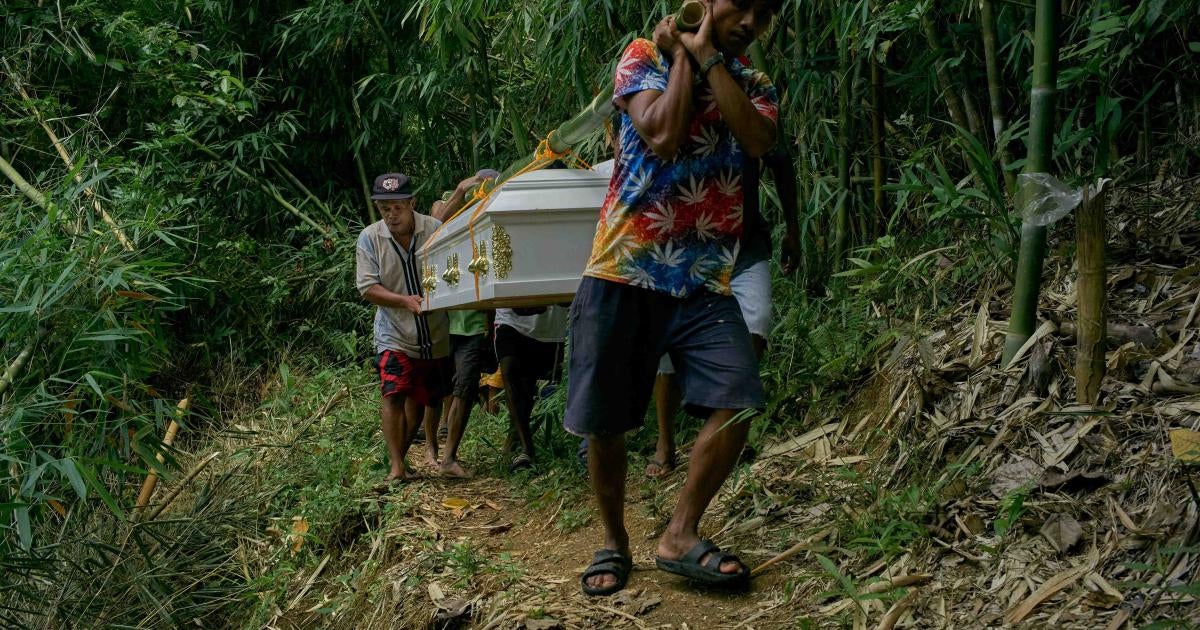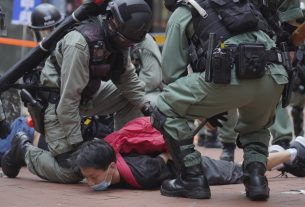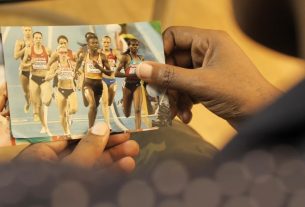(New York) – Philippine authorities are using “red-tagging” and other forms of threats and violence to intimidate Indigenous leaders and activists opposed to government-backed projects in the Philippines, Human Rights Watch said today. The longtime practice of “red-tagging,” in which those resisting projects are accused of being fighters or supporters of the communist insurgency, makes them potential targets of government security forces.
The harassment and attacks against Indigenous peoples contribute to making the Philippines one of Asia’s most dangerous countries for environmental activists and land defenders. Activists are also harassed through the justice system, with many facing politically motivated charges for defamation and other fabricated offenses. The administration of President Ferdinand Marcos Jr. should urgently issue a clear directive to all government officials to stop red-tagging and take appropriate action against those responsible.
“The Philippine officials’ red-tagging of Indigenous leaders and activists has often proven deadly and put their communities at risk,” said Phil Robertson, deputy Asia director at Human Rights Watch. “Indigenous communities have the right to peacefully express their views and protect their land and cultural heritage without fear of violence or death.”
Several Indigenous leaders and their advocates told Human Rights Watch about being red-tagged and that the false accusations harmed their lives and work. Beverly Longid, national convener of Katribu, a political party that advances Indigenous peoples’ rights, has long been targeted for harassment and red-tagging. “Even before I joined Katribu in 2009, I was already being red-tagged,” Longid said. She is former chair of the Cordillera People’s Alliance, an outspoken Indigenous rights network.
The harassment has taken many forms, Longid said, including the circulation of her photo retouched to depict her wearing underwear, a pair of horns, and fangs. In 2020, during a news conference organized by the local police and livestreamed on Facebook, a police informant accused her of being a recruiter for the communist New People’s Army (NPA) insurgency, but she was never charged.
Companies involved in projects often work closely with the police and military to secure control over project areas, which can raise tensions and result in violence. Rival Indigenous groups have been organized to serve as a foil against groups criticizing these projects, claiming to represent the entire community in support of the project despite opposition.
Red-tagging has been used to exclude dissenting Indigenous communities from the requirement of “free, prior and informed consent,” the international legal principle that has been incorporated into the Philippine Indigenous Peoples Rights Act of 1997. Companies have a responsibility to mitigate any harm that stems from their activities under the United Nations Guiding Principles on Business and Human Rights.
Longid said that she suspects that her work in recent years, particularly bringing Indigenous peoples’ rights issues before the UN Human Rights Council, has made her a prime target. “We are very active in human rights mechanisms in the UN, that’s why they’re going after us,” Longid said. “We are always watching our backs.”
Prince Turtogo, national coordinator of Panaghiusa, a broad Philippine network of Indigenous peoples’ groups, said that his organization found that red-tagging often escalates into violent attacks. During the administration of President Rodrigo Duterte, Panaghiusa recorded 126 cases of extrajudicial killings of leaders and members of Indigenous communities from 2016 to 2021. “All of those Indigenous leaders and civilians or their groups experienced red-tagging at least at one point,” Turtogo said.
Indigenous rights activists have also been harassed though the court system, with politically motivated cases of defamation, terrorism, and common crimes filed against them. Sarah Dekdeken, chair of the Cordillera People’s Alliance, was convicted in December 2022 of a cyber-libel charge filed against her by a police officer whom Dekdeken had accused in a social media post of ordering the removal of monuments dedicated to tribal leaders. Windel Bolinget, another Indigenous rights leader from the northern Philippines, is facing murder charges that he asserts were fabricated to harass him for his advocacy.
Red-tagging, Turtogo said, “makes the human rights violations more extensive as it strips the victims of the protections of the law because they’re tagged as communists or terrorists.” He said that red-tagging is often a precursor to violent attacks and is used to justify human rights violations.
Philippine security forces have used red-baiting for decades in their campaign against the communist insurgency, and despite international criticism its use has not lessened. The UN Human Rights Council, the European Union, and other international actors have all spoken out against red-tagging, but Philippine authorities continue to provide support and approval for the practice. In October 2022, the justice secretary defended red-tagging before the UN Human Rights Council, calling it “part of democracy.”
Units of the Philippine National Police and the Armed Forces of the Philippines have also engaged in red-tagging through social media posts. Tarps and streamers have been posted on walls and buildings, with the names and pictures of those targeted. In the case of Kalikasan, an environmental group that advocates for the rights of Indigenous peoples and environmentalists, unidentified men put up red-tagging streamers made of used plastic sacks and threw some of these in front of Kalikasan’s office in Quezon City, Metro Manila. Red-tagging has also occurred during official meetings, such as town council sessions, in which officials have alleged that identified Indigenous leaders are affiliated with rebel groups.
Other government agencies involved in red-tagging of Indigenous leaders and members are the National Intelligence Coordinating Agency and the presidential National Task Force on Ending Local Communist Armed Conflict. Pro-government media networks such as Sonshine Media Network International, which has partnered with the military in spreading anti-communist propaganda, have also used red-tagging.
Red-tagging has had a lasting impact on Indigenous communities on issues unrelated to the communist insurgency. It has been used to harass, threaten, and sideline leaders and members of Indigenous communities who oppose major projects such as mining operations and hydropower dams across the country.
“Ancestral lands with impending or existing projects are often the areas where the red-tagging occurs,” Turtogo said. He cited the cases of the hydroelectric project at Kaliwa Dam in the Sierra Madre mountain range, the Gened Dam in Apayao province, and the OceanaGold mining project in Nueva Vizcaya province, all on Luzon island.
“Because of the red-tagging, organizing these communities have become difficult,” said Jon Bautista, national coordinator of Kalikasan. “It hampers our efforts to engage with affected communities.”
Opposition to projects from Indigenous communities has frequently led the military to increase its presence in affected areas. In the past, a heavy military presence, often accompanied by increased operations by the New People’s Army, has brought more volatility to the situation. Human Rights Watch and others have long documented human rights abuses by military and paramilitary forces against Indigenous community leaders and members. The New People’s Army has also been responsible for attacks targeting Indigenous leaders deemed to be working with the government.
“Very often Indigenous leaders and their communities have become pawns of the Philippine military and the New People’s Army at great cost to their lives and way of life,” Robertson said. “Concerned governments should denounce the deadly red-tagging and press the Marcos government to end it.”



